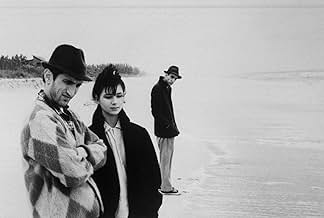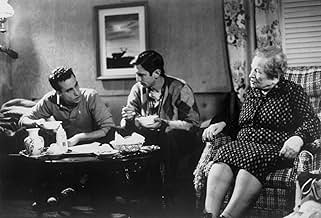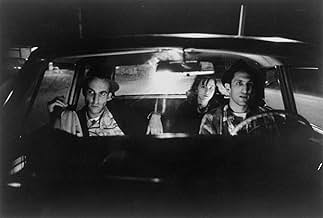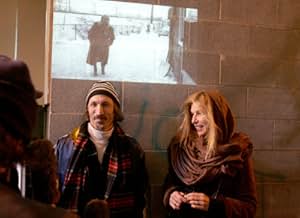IMDb रेटिंग
7.4/10
42 हज़ार
आपकी रेटिंग
एक न्यू यॉर्कर के जीवन को एक टेलस्पिन में फेंक दिया जाता है।एक न्यू यॉर्कर के जीवन को एक टेलस्पिन में फेंक दिया जाता है।एक न्यू यॉर्कर के जीवन को एक टेलस्पिन में फेंक दिया जाता है।
- पुरस्कार
- 8 जीत और कुल 2 नामांकन
फ़ीचर्ड समीक्षाएं
An excellent example of why independent films are so invaluable, `Stranger Than Paradise,' written and directed by Jim Jarmusch, is a bare-bones production that never would have found the light of day in the mainstream. Essentially a character study, the story is a glimpse into the lives of three people: Willie (John Lurie); his cousin, Eva (Eszter Balint), recently arrived in New York from Hungary; and Willie's friend, Eddie (Richard Edson). After a couple of weeks in the Big Apple with Willie, Eva moves to Cleveland to live with their Aunt; a year later, Willie and Eddie are off to visit her. One thing leads to another, and the trio wind up in Florida (the designated paradise of the title). Watching this film is like spending time with some people you know; the characters are real people, so much so that watching them becomes almost voyeuristic, the camera somehow intrusive, exposing as it does the private lives of these individuals. It succinctly captures their lack of ambition, the ambiguity with which they approach life, and the fact that they seemingly have no prospects for the future beyond whatever a lucky day at the track affords them. The action, such as it is, is no more than what you would find in the average day of someone's life. The dialogue is what drives the film, though frankly, nothing they have to say is very interesting. And yet, this is an absolutely engrossing film; sometimes amusing, at times hilarious, but mesmerizing throughout. The performances are entirely credible, and again, you never have the sense that these are actors, but rather real people who happen to have had some moments from their lives filmed and presented to the audience for perusal. Jarmusch has an innate sense of capturing the essence of the everyday and transforming the most simplistic and mundane events into refreshingly documented, worthwhile viewing. It's an inspired piece of film making, helped to some extent by the stark black&white photography that adds to the realism of the overall proceedings. The use of brief blackouts during transitions works effectively, as well as providing the film with a unique signature. Original music is by Lurie, but the highlight is the use of the song `I Put A Spell On You,' by Screamin' Jay Hawkins, used recurringly throughout the movie, and which exemplifies that special touch Jarmusch brings to his projects. And there's a superb bit of irony at the end that really makes this gem sparkle. The supporting cast includes Cecillia Stark (Aunt Lotte), Danny Rosen (Billy), Tom DiCillo (Airline Agent), Richard Boes (Factory Worker) and Rockets Redglare, Harvey Perr and Brian J. Burchill (as the Poker players). `Stranger Than Paradise' may not be to everyone's liking, but to those seeking an alternative to the typical Hollywood big-budget fare available, it just may fit the bill and provide a satisfying, entertaining experience. I rate this one 8/10.
Watched for the second time the other night, and was struck how formal this really is. Every scene is a single take, some static, some with very stylized camera movement (static shot up the street to an approaching car; pick up car and track it as it passes, static again as it drives off). Occasionally an actor wanders off screen to the right, despite the camera trying to keep up; just this slight effect, surrounded as it is by so much silence and stillness, is enough to produce a slight frisson of tension. Blackouts separate the scenes, but either ambient sound or music cues continue as transitions during the cuts.
The main characters' costumes underline their alienation from the world around them. Judging from the props & surroundings, film seems to be set in contemporary (early-1980s) time. Willie and Eddie dress and act like late-Fifties/early-Sixties racetrack touts, and they seem most at ease in the retro living room of Aunt Lotte, who presumably left Hungary during that period. Eva's costumes likewise proclaim 'outsider,' though the dreary black she wears can signify either a refugee from East Europe or a jaded bohemian poseur.
First viewing a number of years back, I thought the film was offhanded and casual, with not much going on. A second viewing changed my mind - the absolute minimalism of the plot and dialogue leave plenty of space to explore Jarmusch's technique, composition, etc. It made me laugh out loud a couple of times, too.
The main characters' costumes underline their alienation from the world around them. Judging from the props & surroundings, film seems to be set in contemporary (early-1980s) time. Willie and Eddie dress and act like late-Fifties/early-Sixties racetrack touts, and they seem most at ease in the retro living room of Aunt Lotte, who presumably left Hungary during that period. Eva's costumes likewise proclaim 'outsider,' though the dreary black she wears can signify either a refugee from East Europe or a jaded bohemian poseur.
First viewing a number of years back, I thought the film was offhanded and casual, with not much going on. A second viewing changed my mind - the absolute minimalism of the plot and dialogue leave plenty of space to explore Jarmusch's technique, composition, etc. It made me laugh out loud a couple of times, too.
Reading over the comments so far, it seems that most people think this film is great, with a rare few criticizing it for being a boring 'student-film'.
People, this is for sure not a film for those who've been brutalized by too much Hollywood cinema - it's a quiet movie that you absorb slowly. It's very well done and quite absorbing. Sure it makes me think of so-called student-films (my brother is in film school), but that's not to say it's not a damn good one. There's something to be said for beautiful photography (the black and white images go so well with the feelings of emptiness and coldness) and the search for a meaning in life. These people are desperately in need of meaning and affection, none of which they seem to be able to find - or give. This is a movie about that desperate search.
And it's well worth seeing - for those with a bit of patience and artistic sensibility. It's a movie about emptiness for sure, but is by no means 'boring'. I'd give it 4/5 stars.
People, this is for sure not a film for those who've been brutalized by too much Hollywood cinema - it's a quiet movie that you absorb slowly. It's very well done and quite absorbing. Sure it makes me think of so-called student-films (my brother is in film school), but that's not to say it's not a damn good one. There's something to be said for beautiful photography (the black and white images go so well with the feelings of emptiness and coldness) and the search for a meaning in life. These people are desperately in need of meaning and affection, none of which they seem to be able to find - or give. This is a movie about that desperate search.
And it's well worth seeing - for those with a bit of patience and artistic sensibility. It's a movie about emptiness for sure, but is by no means 'boring'. I'd give it 4/5 stars.
10romper-2
I just finished watching Stranger Than Paradise on DVD - the first time I'd seen it since its year of release. I'd always recalled the film with fondness, although I could never remember why I liked it. Several years after seeing the movie I came across the John Lurie soundtrack and bought it without stopping to listen, and been slightly taken aback by it. The haunting pieces were more emotionally esoteric than I expected, and it took some time for the album to grow on me.
Seeing the movie again, I understand why. The only piece of popular music in the film is Screamin' Jay Hawkin's "I Put a Spell on You" and, although I had forgotten that it was there, I guess that I had expected the soundtrack to be more like those of mainstream movies and have songs and such-like. I think that Lurie's music is perfect in situ and, as I've said, the soundtrack has also grown on me as standalone pieces.
The movie itself is a masterpiece. The black and white images present a starkness and a clarity that heightens the alienation of self in a land that was supposed to be the new hope for immigrants from a decaying old world. Instead we see Eva walking through a deserted ghost world of New York where the graffiti says "Yankee go home". America is only a dream, a collective vision of a better world; paradise somewhere on earth.
As Willie and Eddie journey west after winning some money, we see that the supposedly beautiful city of Cleveland is cold and desolate with a frozen lake. The further trip to Florida ends in the middle of nowhere next to a bleak and windswept ocean. Paradise is still somewhere out of reach. I think that's why the movie appeals to me. It shows that the America of popular mythology - the home of the brave, land of the free, protector of the downtrodden, guardian of democracy in the free world - is merely a construct. Too many people these days believe in the child's fantasy of America being some paradise that Iraq and Afghanistan should emulate. Jarmusch reminds us that it is people who give meaning to a symbol, not the other way around. He allows for the ability of people to make their own meanings and evolve beyond the stagnation of popular culture.
At a time I originally saw this movie I had recently left home and got my first job, moving from the country to the city, and maybe to some extent I identified with Eva - moving from Budapest to America. It was also my first taste of grownup film, if I recall correctly, and confirmed me with a lifelong fascination with the cinema. I have a lot to thank Jim Jarmusch for.
Seeing the movie again, I understand why. The only piece of popular music in the film is Screamin' Jay Hawkin's "I Put a Spell on You" and, although I had forgotten that it was there, I guess that I had expected the soundtrack to be more like those of mainstream movies and have songs and such-like. I think that Lurie's music is perfect in situ and, as I've said, the soundtrack has also grown on me as standalone pieces.
The movie itself is a masterpiece. The black and white images present a starkness and a clarity that heightens the alienation of self in a land that was supposed to be the new hope for immigrants from a decaying old world. Instead we see Eva walking through a deserted ghost world of New York where the graffiti says "Yankee go home". America is only a dream, a collective vision of a better world; paradise somewhere on earth.
As Willie and Eddie journey west after winning some money, we see that the supposedly beautiful city of Cleveland is cold and desolate with a frozen lake. The further trip to Florida ends in the middle of nowhere next to a bleak and windswept ocean. Paradise is still somewhere out of reach. I think that's why the movie appeals to me. It shows that the America of popular mythology - the home of the brave, land of the free, protector of the downtrodden, guardian of democracy in the free world - is merely a construct. Too many people these days believe in the child's fantasy of America being some paradise that Iraq and Afghanistan should emulate. Jarmusch reminds us that it is people who give meaning to a symbol, not the other way around. He allows for the ability of people to make their own meanings and evolve beyond the stagnation of popular culture.
At a time I originally saw this movie I had recently left home and got my first job, moving from the country to the city, and maybe to some extent I identified with Eva - moving from Budapest to America. It was also my first taste of grownup film, if I recall correctly, and confirmed me with a lifelong fascination with the cinema. I have a lot to thank Jim Jarmusch for.
I honestly think this is a film that people are afraid to admit they don't find funny or like. I read reviews from critics blasting films for not having enough plot, for being boring, for being poorly written, poorly acted, etc. And here is a film with all these negative attributes, and it's considered a classic.
I went to film school with Ms. Balint and wanted desperately to like this film, watching it as much as four times -- twice on tape and twice on A&E. I did not find all those attributes others had christened it with because frankly, they do not exist. Then I remember The Elephant Man, and the early critics using the title to savage it; "It moves at an elephant's pace", read one. Then everyone jumped on the bandwagon and never a bad word about the film again. I think this is the case for Stranger Than Paradise. The film presents the boredom and monotony of three lost people's lives, and it succeeds by itself being boring and monotonous.
I also think viewers have to put more into this film to seek enjoyment, just as an art critic will look at a solid black canvas and see the life cycle of man's humanity and mortality. And the fact is, it's just a black canvas. That is what I think this movie is. I just happen to think that it caught the people at Cannes during an odd time where they found it amusing, and then from that time out, everyone was afraid to say anything negative about it for fear of being ridiculed for "not getting it." In my opinion -- and acknowledging everything regarding the arts is subjective -- this is an average, gimmicky (mastershots and blackouts) student film.
I would rate this film 1/2 star, if that at all. Sorry to disagree with all you intellectuals out there. I enjoy a good classic film, domestic or foreign, but I do not like films that sportnon-existent writing, acting, or direction. To be snide, I've seen the Emperor, and that b*****d is buck-naked.
I went to film school with Ms. Balint and wanted desperately to like this film, watching it as much as four times -- twice on tape and twice on A&E. I did not find all those attributes others had christened it with because frankly, they do not exist. Then I remember The Elephant Man, and the early critics using the title to savage it; "It moves at an elephant's pace", read one. Then everyone jumped on the bandwagon and never a bad word about the film again. I think this is the case for Stranger Than Paradise. The film presents the boredom and monotony of three lost people's lives, and it succeeds by itself being boring and monotonous.
I also think viewers have to put more into this film to seek enjoyment, just as an art critic will look at a solid black canvas and see the life cycle of man's humanity and mortality. And the fact is, it's just a black canvas. That is what I think this movie is. I just happen to think that it caught the people at Cannes during an odd time where they found it amusing, and then from that time out, everyone was afraid to say anything negative about it for fear of being ridiculed for "not getting it." In my opinion -- and acknowledging everything regarding the arts is subjective -- this is an average, gimmicky (mastershots and blackouts) student film.
I would rate this film 1/2 star, if that at all. Sorry to disagree with all you intellectuals out there. I enjoy a good classic film, domestic or foreign, but I do not like films that sportnon-existent writing, acting, or direction. To be snide, I've seen the Emperor, and that b*****d is buck-naked.
क्या आपको पता है
- ट्रिवियाDirector Jim Jarmusch was dismayed to discover all the money he paid for the rights to Screamin' Jay Hawkins' "I Put a Spell on You" went to the record company, with nothing going to Hawkins himself. When the film earned a profit, Jarmusch took it upon himself to track down Hawkins (who was living in a trailer park, at the time) and give him some money. It was the beginning of a friendship that lasted until Hawkins' death. According to Jarmusch, Hawkins continuously swore he'd pay him back, despite Jarmusch's insistence that the money was a gift.
- गूफ़When Eddie and Willie are driving to Cleveland, the camera and camera operator can be seen in the reflection of the rear view mirror.
- कनेक्शनEdited from Stranger than Paradise (1983)
- साउंडट्रैकI Put a Spell on You
Written by Screamin' Jay Hawkins (as Jay Hawkins)
Used by permission of CBS Unart Catalog, Inc.
All Rights Reserved.
Performed by Screamin' Jay Hawkins
Courtesy of CBS Records
टॉप पसंद
रेटिंग देने के लिए साइन-इन करें और वैयक्तिकृत सुझावों के लिए वॉचलिस्ट करें
- How long is Stranger Than Paradise?Alexa द्वारा संचालित
विवरण
- रिलीज़ की तारीख़
- कंट्री ऑफ़ ओरिजिन
- भाषाएं
- इस रूप में भी जाना जाता है
- Extraños en el paraíso
- फ़िल्माने की जगहें
- 464 Newark St, होबोकेन, न्यू जर्सी, यूएसए(Corner building when Eva first arrives and walks to apartment)
- उत्पादन कंपनियां
- IMDbPro पर और कंपनी क्रेडिट देखें
बॉक्स ऑफ़िस
- बजट
- $90,000(अनुमानित)
- US और कनाडा में सकल
- $24,36,000
- दुनिया भर में सकल
- $24,54,393
- चलने की अवधि1 घंटा 29 मिनट
- रंग
- पक्ष अनुपात
- 1.85 : 1
इस पेज में योगदान दें
किसी बदलाव का सुझाव दें या अनुपलब्ध कॉन्टेंट जोड़ें


















